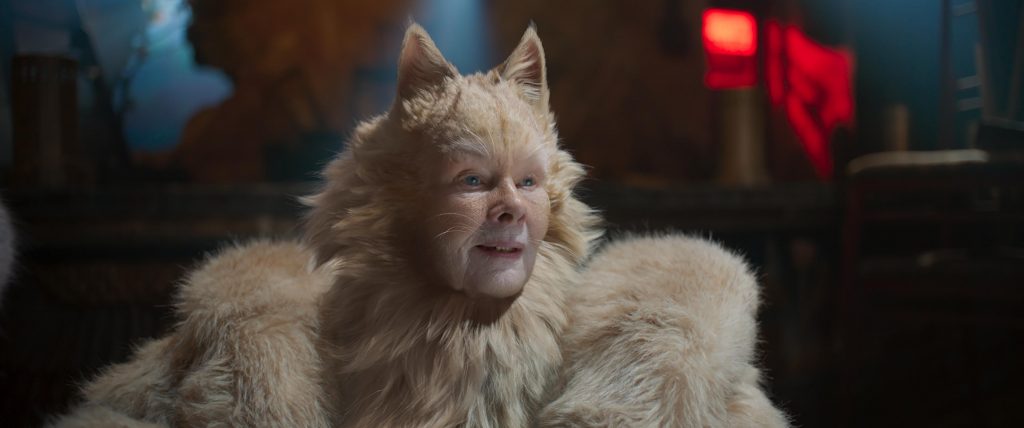BY CHARLES MCNULTY, LOS ANGELES TIMES
When we first encounter the Roy Cohn of Tony Kushner’s “Angels in America,” he’s furiously working his phones. To soothe an irate client, he offers tickets to “Cats,” a Broadway show he knows this rube will appreciate. “It’s about cats,” he explains. “Singing cats, you’ll love it. Eight o’clock, the theater’s always at 8.”
After he hangs up, he calls her a bleeping tourist. The line always kills, because, while “Cats” will always be popular, it also will always be a joke.
“Cats,” Andrew Lloyd Webber’s blockbuster spun from the light verse of T.S. Eliot’s “Old Possum’s Book of Practical Cats,” is a paradox and a puzzle illustrating the disconnect between theatrical success and respect. The fourth-longest-running show in Broadway history, it is the consummate tourist musical. (“Broadway’s first show for the tired Japanese businessman,” according to Ken Bloom and Frank Vlastnik’s indispensable “Broadway Musicals: The 101 Greatest Shows of All Time.”)
Theater people resent “Cats” not just because it made Broadway uncool until “Hamilton” finally rescued it from the pop cultural stocks. What really infuriates buffs is that “Cats” ushered in an era of grandiose spectacle, the vacuous parade of shows from the 1980s and early ‘90s that made it seem as if a musical had to have a helicopter or a crashing chandelier to be worth the rapidly rising ticket price.
Yes, “Cats,” the hit that resuscitated the long-moribund British musical from oblivion, won the 1983 Tony for best musical. Hell, even dead Eliot won for best book, a Tony to shore against his ruins. But few with any real discernment thought the show was any good, notwithstanding the overheated British hype machine.
Rather than press my case, let me introduce Elaine Stritch, whose feelings are recorded for posterity in “Still Here,” Alexandra Jacobs’ recent biography of the craggy-voiced Broadway trouper, who was apparently considered for a possible narrator role in “Cats”: “Prepared to be grateful, Stritch went to see a preview of the show at the New London Theater in the West End. ‘I just hated every minute of it,’ she said. ‘The first act, I was all dressed up and the cats came out through the audience. They were mussing people’s hair and — you, now touching me! One of them came near me — I remember looking at it and saying, “Don’t touch me.” That’s how much I hated that show. I didn’t want anything to do with it.’” According to Jacobs, Stritch walked out at intermission.
The trailers for Tom Hooper’s newly released film version of “Cats” had the Twitterverse ready to pounce. Questions were raised about whether the cats of “Cats” were supposed to have human-shaped breasts. Some wondered why a teaser for a musical was downplaying the singing. But knowing the show as I do, I had no expectations to be smashed. I showed up to the screening not to mock a travesty but to see what in the world could be done cinematically with such intractable material.
My colleague Justin Chang did what any humane critic must do in this situation: He euthanized the film. “Cats” is now the laughingstock of the movie world. But the musical will always be with us. Nothing can destroy it. Public curiosity, Taylor Swift and the rest of the starry cast might drive ticket sales. Somewhere, some quixotic director is scratching out plans for another revival. Tourists right now are being born to replenish future audiences.
Surely there must be some feline magic in the musical’s weave. Popular taste can be easily dismissed. But how to account for the way the show has always attracted top theatrical talent? Trevor Nunn, the show’s original director, was the artistic director of the Royal Shakespeare Company at the time. He didn’t have to turn his attention from “Hamlet” and “Romeo and Juliet” to a theatrical litter box.
Of course the prospect of grand commercial success is a powerful lure. But “Cats” was initially seen as a ludicrously risky endeavor. The word from rehearsals, when “Cats” was bounding for its 1981 West End debut, was DOA. Judi Dench, who had been cast as Grizabella, the Tottenham Court Road cat with the shady past, snapped her Achilles tendon and had to pull out. Disaster seemed preordained.
What ultimately rescued “Cats” from failure was the directness of its theatrical appeal. This is a dance musical, in which the book is subsidiary to spectacle and motion. Nunn helped patch together a narrative by borrowing material from elsewhere in Eliot’s oeuvre, but the story is as jury-rigged as a carpeted cat tree.
The original choreography by co-director Gillian Lynne elicited just enough subliminal eroticism from the strange situation of adult theatergoers gathering to watch a company of actors prance around for two hours in body-hugging cat costumes. Audiences members could, under the auspices of the author of “The Waste Land,” turn off their cognitive faculties and secretly indulge in some vicarious cosplay. But mostly it was just a dusky pantomime set on an urban Disneyland trash heap. Perfect for those exhausted businessmen to sneak in a cat nap.
Threaded through the revue was an operatic tale of tattered Grizabella’s redemption. This ostracized cat doesn’t cough bloody hairballs into her handkerchief, but she does get her own Puccini-flavored ballad in “Memory,” the song that earned Elaine Paige in London and Betty Buckley in New York eternal fame.
Audiences developed a Pavlovian response to those insinuating moonlight chords introducing the song. Jennifer Hudson’s sobbing rendition doesn’t hold a candle to Paige’s or Buckley’s. The blunt emotionalism seems to be a diversionary strategy to keep us from recognizing that this tricky number is outside her range. Nevertheless, I found myself flicking away a tear at the end.
No, I’m not proud to have momentarily succumbed. But there were longueurs to get through. “Cats,” on the big screen as well as onstage, is shot through with tedium.
The film rubs the wrong way at points. (Why did James Corden, who looks more like a penguin than a cat, and Rebel Wilson, who sprawls gamely on her back, submit themselves to so much fat shtick?) The plot rebuffs scrutiny. You’ll wring no information from me about this jellicle tribe.
The film’s new material seems designed to give Swift more to do. (She moves with a lithe loveliness, by the way, in a movie that often behaves like a music video.) I’m not really sure how to respond to choreography that’s CG-enhanced. (Oh, that was a dazzling computerized leap!) But I gazed as dutifully as my two cats do when birds are frolicking in the tree outside the window.
No, I didn’t hate-watch the movie. How could I? Dench, finally getting her crack at whiskers, is in the cast. She plays the wise-elder cat Old Deuteronomy, who selects the feline who will be granted a new life. Some actors you would pay to hear read the phone book. I’d go into debt to listen to Dench give a dramatic recitation of “Cats.”
Before you accuse me of going soft, let me remind you that felines in musicals have a special power. “Cats,” as I’ve mentioned, is the fourth-longest-running musical in Broadway history. Want to know what’s third? “The Lion King.”
These theatrical tabbies and toms will survive this latest wreck. (Gulp!)




